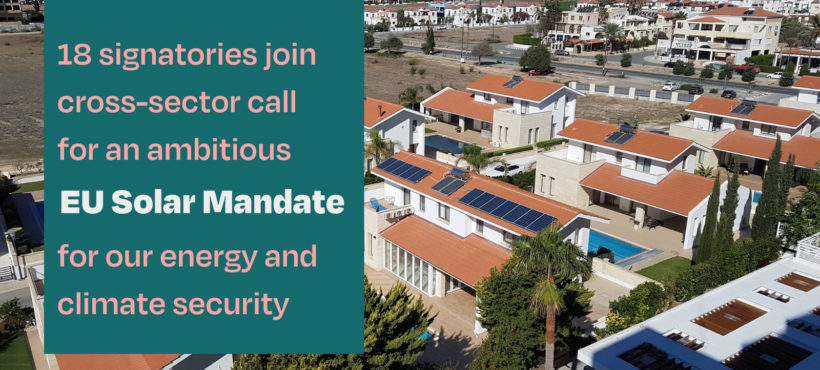In a joint letter, 18 organisations from across the economy, including NGOs and city representatives, the construction, EV, and renewable heating sectors, and flexibility service providers, as well as solar PV and solar thermal industries, call on EU Energy Ministers and the European Parliament to support an ambitious EU solar mandate.
In May 2022, the European Commission proposed an EU Solar Rooftop Initiative, as part of REPowerEU plans to disentangle the continent from fossil gas dependency. To maximise the potential of the Initiative within the EPBD, the letter urges the inclusion of an EU requirement to install solar on all new and renovated buildings, as well as existing non-residential buildings.
Signatories underline that every additional solar kWh reduces European dependency on gas and other fossil fuels – solar heat and solar PV combined with electric heat pumps or vehicles offer a comprehensive fossil-free solution for heating and mobility. While gas price volatility threatens European citizen’s and businesses, the payback time of solar energy on buildings is steadily decreasing. Buildings offer immense solar deployment potential, allowing citizens to generate their own energy while reducing electricity energy bills and providing services to the grid thanks to their demand-side flexibility.
According to the European Joint Research Centre, solar PV on buildings can deliver 25% of Europe’s annual electricity demand, equal to the electricity consumption of Germany and Poland combined. At the same time, the European Commission estimates that solar thermal can triple its capacity by 2030, contributing to the decarbonisation of the heating and cooling sector, which represents the main use of Russian gas.
An ambitious EU solar mandate is necessary to accelerate the solar roll-out at a crucial time. Through a solar requirement, Europe can reduce citizen and societal costs by decreasing companies’ marketing expenditure, while promoting collective self-consumption energy models. The letter also points to the significant role of an ambitious solar mandate in supporting the necessary deep renovation of Europe’s building stock (which accounts for 36% of EU CO2 emissions) and ensuring that buildings are well-integrated into an efficient and decarbonised energy system.
The mandate will send a critical signal to workers and companies to train for the huge numbers of jobs generated by the renewable transition and renovation wave. By 2030, solar thermal will generate 250,000 jobs, while under an EU 45% renewable target for Europe, solar PV will need 880,000 by the same year.
Legislation to install obligatory solar on buildings is already occurring throughout Europe. Countries such as Belgium (Flanders), the Netherlands, and Switzerland have solar mandates on existing buildings in place. In 7 EU countries, there is a solar mandate on renovated buildings, and in 9 EU countries, there is a solar mandate on new buildings. Now is the time to make it an EU norm.
Pedro Dias, Secretary General of Solar Heat Europe, comments: “Europe is paying the price of its over reliance on fossil fuels, particularly considering that space and water heating represent 80% of the energy demand in EU households. Over 10 million EU households have a solar thermal system installed and benefit from this EU-made free source of heat. The use of European rooftops to install solar thermal, solar PV or hybrid PV & thermal (PVT) systems is essential to accelerate EU’s quest for secure, affordable, and sustainable energy supply.”
Walburga Hemetsberger, CEO, SolarPower Europe, says, “The solution to lowering energy bills, ensuring energy security, and meeting our climate ambitions is right over our heads: rooftop solar. An ambitious solar requirement on all buildings will support the rapid roll out of efficient, decarbonised solar buildings, while encouraging the expansion of the necessary green workforce.”
Seda Orhan, CAN Europe Renewable Energy Campaign Coordinator comments: “In the midst of an energy prices crisis where soaring energy bills are pushing more and more people into energy poverty, it’s disheartening to see that there aren’t more roofs with solar PVs on them. Making the installation of solar energy mandatory on our buildings is a ‘winning’ initiative that can empower Europe’s citizens, communities, and businesses to generate their own energy, help Europe wean itself off Russian fossil gas and enhance its energy security, while also reducing emissions. Overall, putting us all on a path to a safer, energy secure future.”
Alix Bolle, Policy Lead at Energy Cities, comments: “We can no longer afford to underperform on our renewable energy ambitions. Rooftop solar is a no brainer and it needs urgent and massive scale-up. But local governments are ill-equipped and understaffed to deliver on this challenge so higher ambitions will have to be matched with higher means.”
Fernando Sigchos Jiménez, Secretary General, European Builders Confederation comments: “Construction SMEs are at the heart of the Renovation Wave and the European Green Deal, as well as key actors for solar installations on our rooftops. Provided that citizens and SMEs are accompanied with the necessary financial and technical support, and that the essential skills to make this a reality are secured, a solar rooftop mandate could help accelerate the transition towards a more sustainable building sector.”
Quentin de Hults, Director Green & Healthy Buildings at European Copper Institutes, comments: “Rooftop solar is the obvious renewable energy solution for buildings. To achieve zero emission buildings, the solar mandate must accelerate its deployment in combination with energy efficiency improvements and upgrade of technical buildings systems such as electrical installations, heat pumps and storage systems”
Michael Villa, smartEn Executive Director, comments: “Buildings should become system-integrated energy infrastructures. The rollout of rooftop solar combined with other flexible assets like heat pumps, bidirectional EV charging, smart appliances and grid-integrated Energy Management Systems would be crucial to escalate their flexible capacity to support the increasingly variable energy system”.


Leave a Reply